Edition 5/August 2025 Meet the Women Changing Pharmacy 1

3-4 Mulunga Mathoho at PSSA conference 5-6 Five bold moves: Dr Stavros Nicolaou at PSSA conference Highlights from PSSA Conference 20225 Attendees at PSSA conference PSSA conference insights: Marlene Moonsamy 6 7-8 9 10-11 Trinity Pharmacy needs your help 12 Upcoming events 13 Hannelie Cordier, The heart behind the SAAPI desk 14-15 What you need to know about the HPV vaccine 16-17 Meet the new PSSA YPG team 18 The Art of Historic pill crafting 19 SAAPI workshops: September to December 2025 20 Reminder: Tell us about your Golden Moment 21 2
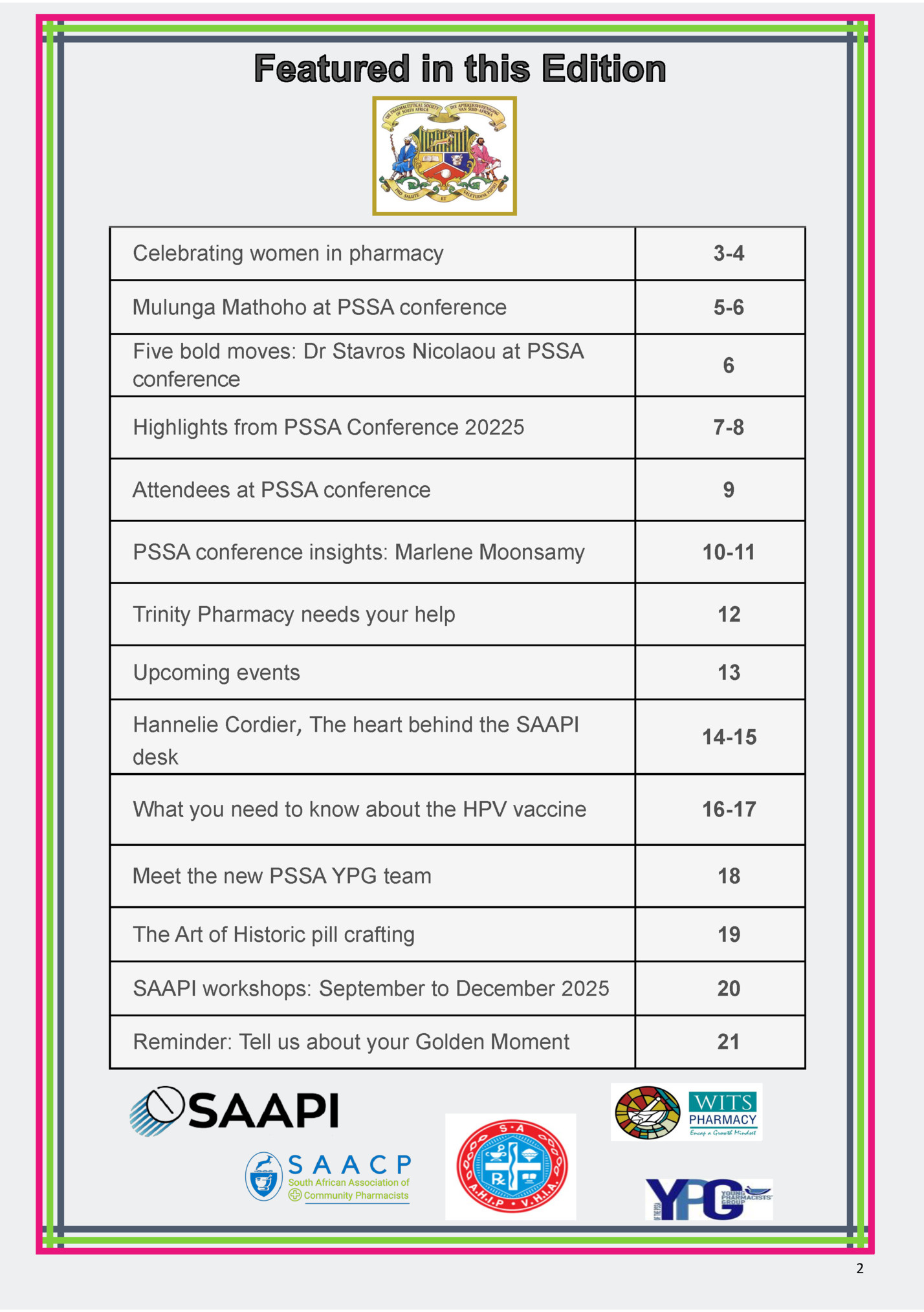
I have served as a retail pharmacist, a pharmacist working in community healthcare as well as a hospital pharmacist. The roles in hospital encompassed hospital and outpatient dispensing, running a full oncology service as well as some clinical pharmacy and antimicrobial stewardship. I have fulfilled the role of Responsible Pharmacist as well as that of a Pharmacy Manager who is also part of the hospital management team. Wearing multiple hats is common occurrence in the life of a pharmacist. A typical day may start off with a staff member struggling with personal issues who needs a friend or confidante to just chat to. This changes rapidly with a phone call from a doctor who needs information when prescribing treatment for a patient with multiple co-morbidities. The role of counsellor now becomes one of a more clinical nature. The next meeting request may be from the company accountant wanting to know why the profit margin is down and you have to put on your accountant hat. You have barely completed that task and the stock controller walks into your office saying that there is stock missing, so you now need to put on your private investigator hat to look at CCTV footage to check what happened to the stock. In between all of this, there are newly diagnosed patients who need counselling with regards to their disease and medication. Training of staff with regards to new drugs and protocols allows Each day is different with clinical pharmacy. I start every morning in one of the ICUs before moving onto the general wards, checking on each patient’s medication and how their current health status is impacting and being impacted by the medication. I then have discussions with the doctors and nurses on how better to manage the patient by offering alternative medication if needed. Jacquie Fox Clinical Pharmacist After completing my BPharm degree, I completed my internship in the private hospital sector and community service in a government hospital. I have since then been working first as a pharmacist in the private hospital sector and then with the introduction of clinical pharmacy, I completed my MPharm and moved into a ward pharmacist and eventually clinical pharmacist role. you to wear the hat of a trainer and last but not least you may need to dispense scripts at the drop of a hat. Bhadrasheila Valla Pharmacy Manager Sibanye Gold Driefontein Pharmacy cal pharmacy and have served on the South African association of hospital and institutional pharmacists branch committee. By being a part of both societies, I have gained a better understanding of medication and it has introduced me to other pharmacists across the country who have the same interests. Even though my current role is mainly prescription review, if the patient is awake and lucid, I will also talk to them to get a better understanding of how they are and how their condition and treatments are affecting them and discussing concerns about their medication. I will also be answering questions and concerns regarding out of stock medication from other healthcare professionals. I am also currently serving my second term as the treasurer for the South African society of clini- 3
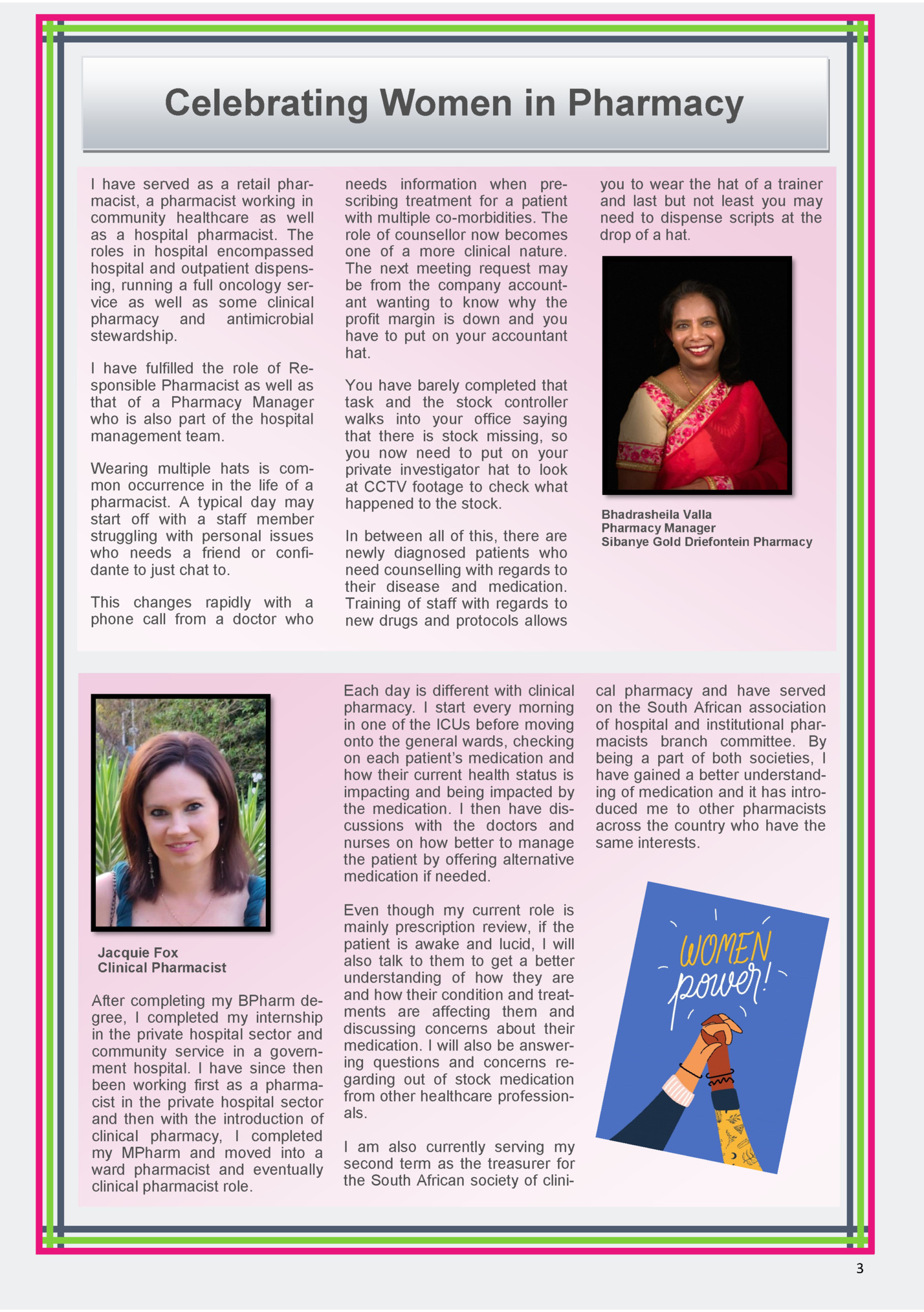
What drove 17-year-old me to pursue pharmacy? A desire to help people heal - without dealing with too much blood. Pharmacy felt like the next best thing. Back then, I only saw the patient-facing side of the profession; the person behind the counter. But as my knowledge, skills, and love for pharmacy deepened over the years, I discovered a greater purpose: using pharmaceutical expertise to strengthen access to life-saving medicines and ensure systems work - not just on paper, but for people. Over time, I found my niche where data, supply chain support, policy, and pharmaceutical systems strengthening intersect. My current role and the hats I wear: I currently serve as a Quantitative Analyst at the National Department of Health’s Affordable Medicines Directorate. Previously, as a Provincial Technical Advisor under the USAID-funded EpiCSCTA project, I supported the institutionalisation and/or optimisation of supply Monsenique Botha chain tools like the Stock Visibility System (SVS), SVS COVID-19, RxSolution, Quantitative Analyst Pharmacist and the National Surveillance Centre (NSC) - both provincially and nationally. My role spanned: • Strengthening medicine availability through digital systems and technical support. • Leading capacity building and training for healthcare workers. • Advocating for better data quality to improve visibility and decision-making. • Contributing to SOP development, training material, system enhancements, and policy implementation. • Additionally, I served as a two term member of the Pricing Committee and Chair of the Single Exit Price Task Team. A day I wore many hats: One unforgettable day involved a site visit at a hospital pharmacy and IT team transitioning from manual dispensing to e-dispensing on RxSolution. Later, I provided one-on-one NSC support, troubleshot SVS reports for a district pharmacist, and completed a technical report on medicine pricing - all before the day ended. It was the kind of day that proves pharmacists don’t just wear white coats - we wear many hats, and we wear them well. The public health impact of my work: Every system strengthened, dataset cleaned and analysed, and healthcare worker trained has contributed to better medicine access and equity. By supporting data-driven redistribution and reducing stockouts, I’ve helped ensure that patients don’t leave empty-handed - and that pharmacy services stay responsive and resilient. Supporting access through systems and policy is an extension of pharmacy’s core mission. I’m also pursuing a Master of Pharmacy in Public Health and Pharmacy Management at Sefako Makgatho University, further deepening my insights to health systems strengthening and pharmaceutical services management in the field of public health pharmacy. A moment that reminded me why this matters: During COVID-19, I supported public and private vaccination sites with SVS COVID-19 reporting. Watching teams grow confident in using digital tools and data - and seeing the impact on vaccine distribution - was a powerful reminder that our behind-the-scenes work saves lives. To those who think pharmacists only count pills… Here’s what I’d say to 17-year-old me: Pharmacists are highly skilled professionals, essential to improving healthcare outcomes. We count impact. We drive policy, analyse data, lead reforms, design systems, and train future healthcare workers. Whether at the dispensary, depot, district, provincial office, or national level - pharmacists are essential. Here’s to the incredible women shaping pharmacy - one system, one solution, one patient at a time. 4
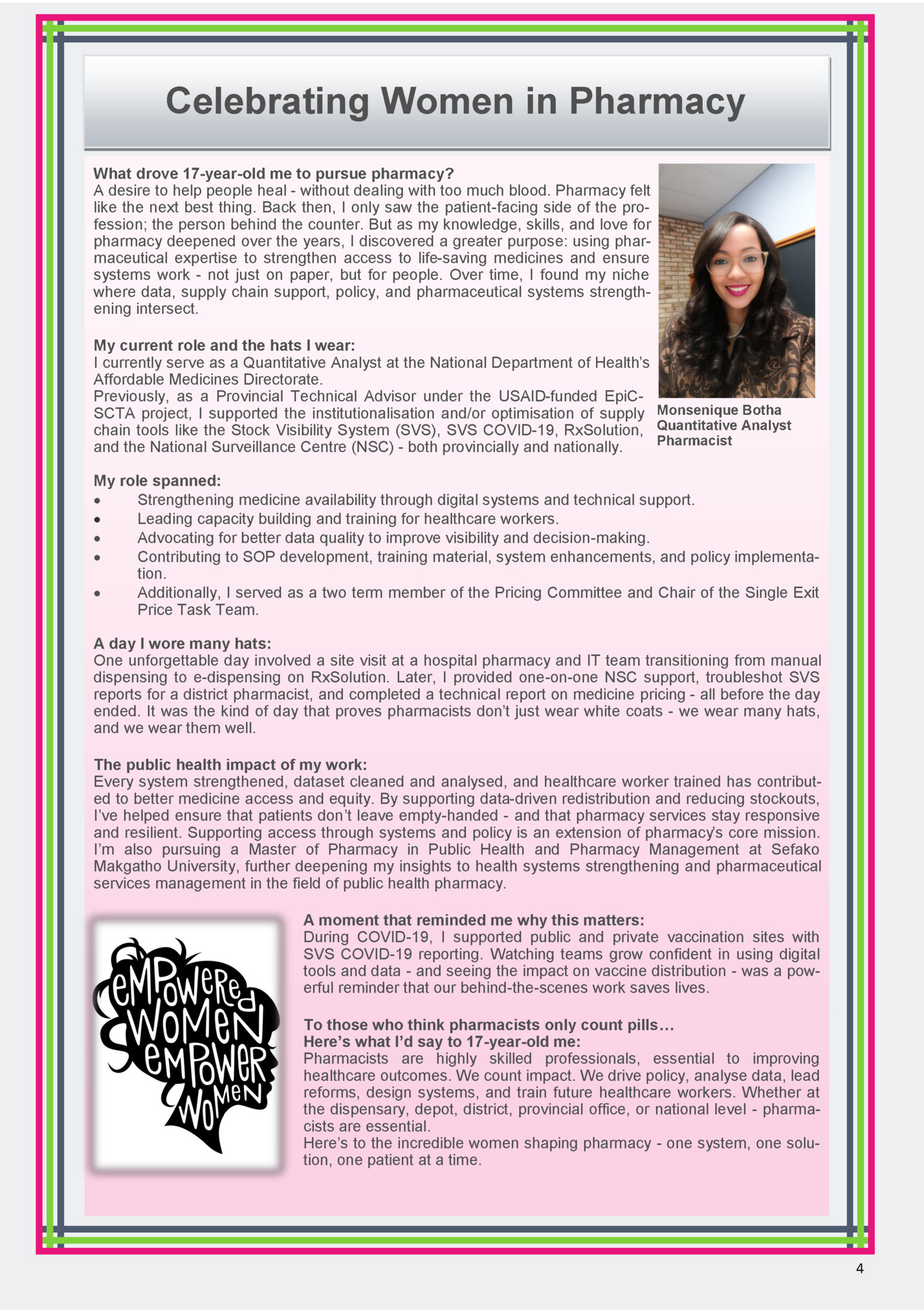
PSSA National Conference 2025 By Mulunga Mathoho I would like to extend my sincere gratitude to the Pharmaceutical Society of South Africa (PSSA) for sponsoring me to attend the PSSA National Conference. It was an honour to be part of this conference. I recently completed my community service and have been feeling anxious about the future and the direction of my career in pharmacy. The conference came at the perfect time to provide motivation, reassurance, and guidance. I gained new knowledge, learnt about new career paths, and connected with leaders who are shaping the future of pharmacy in South Africa. We started off the conference with an impactful session presented by the Minister of Health, Dr Aaron Motsoaledi. The session focused on evolving health systems: Advancing integration for sustainable, peoplecentred care. The key take-home points included: • • • The prioritisation of universal health coverage, Pandemic preparedness, The six building blocks of a healthcare system. The six building blocks of a healthcare system According to WHO (World Health Organisation) a health care system has 6 building blocks: 1. 2. 3. 4. 5. 6. Leadership and governance Access to essential medicines and other commodities Health workforce (Human Resources) Health systems financing Health information systems Health service delivery The second building block— access to essential medicines—highlighted the vital role of pharmacists, as healthcare professionals that understand medicines, and medicines cannot be accessed without pharmacists. Dr Motsoaledi also reflected on the Declaration of Alma-Ata, and how there’s a shift from health being a fundamental human right into becoming money-driven, and that no economic system should rest on that economy can be built on a sick population. The significance of pharmacists in strengthening the health system was further highlighted by the focus on universal health coverage as a means of reducing poverty. Artificial intelligence (AI) formed part of the conference discussions. The message was clear: pharmacy cannot afford to lag behind in a world where AI is rapidly advancing. To stay relevant, pharmacists must define clear boundaries as they move from being operators to orchestrators — guiding and utilising technology in a way that enhances medical outcomes while safeguarding patients On 9 August, Women’s Day, I attended a session titled “Walk in My Heels” – my favourite session of the conference. This session included women pharmacists from diverse sectors who shared their journeys, challenges, and successes. This session was deeply inspiring, as it showed women reshaping the profession, breaking into non-traditional roles, and demonstrating resilience. I was fascinated to learn about medicolegal pharmacy, a field that deals with claims, insurance, and medication-related disputes – something entirely new to me and a reminder of the broad potential of my pharmacy training. Seeing women thrive in such unique spaces encouraged me to think more broadly about my career path. Key take home points: find your passion and niche; make bold career decisions; work smarter & work harder; but courage always wins! Another key theme was the enclosing roles of pharmacists in oncology, diabetes, tuberculosis (TB), and chronic disease management – an area close to my heart as I currently work in public health TB programs. The role of pharmacists at each stage of care is important for treatment adherence & sustainability through continuity of care, adherence counselling ,and improved treatment outcomes. The session showed how integral pharmacists are for long-term disease management such as providing tailored patient education on safe handling of cancer medications to promoting adherence in TB to improving treatment in diabetes and other chronic disorders. 5
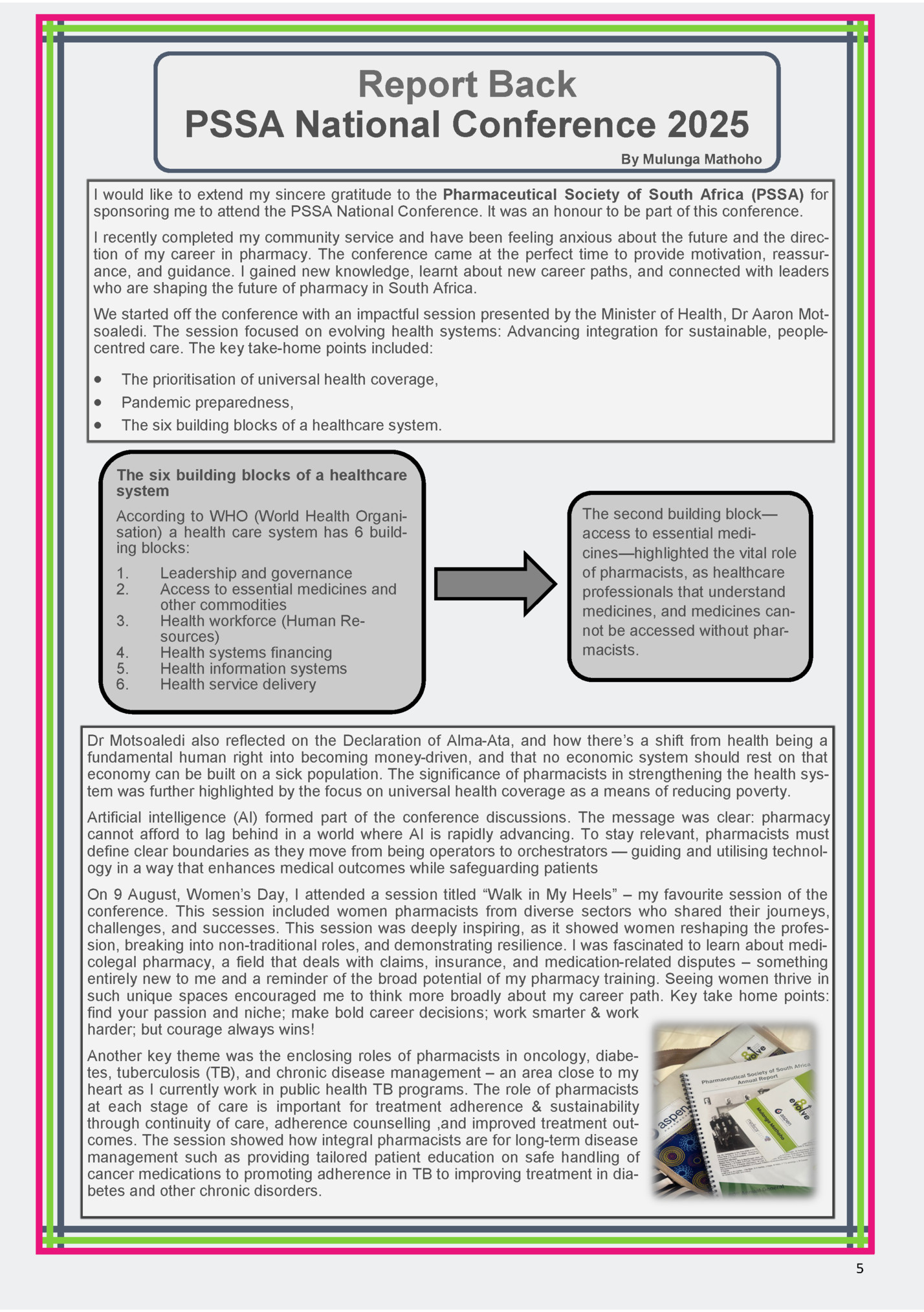
I also gained valuable insights into pharmacogenomics ,a field that studies how genetics influence patients’ responses to medicines .This represents the future of personalised medicine and highlighted the importance of pharmacists staying informed about scientific advancements that can improve therapeutic outcomes and minimise adverse effects. Overall ,attending the conference was an enriching experience .It broadened my understanding current issues ,introduced me two new areas pharmacy ,and reignited my passion for contributing meaningfully to profession .I am truly grateful PSSA for opportunity ,and look forward applying insights gained grow career play active role advancing pharmacy South Africa. With Gratitude, Mulunga Mathoho Five Bold Moves: Dr. Stavros Nicolaou Charts the Path Forward for Pharmacy In a sweeping, high energy address that moved from geopolitics to the pharmacy counter—and back, Dr. Stavros Nicolaou (a SAAPI past president), delivered a clear message: pharmacists are at a turning point. Global turbulence, economic strain, and rapid scientific advances demand bold leadership from the pharmacy profession. Top Takeaways 1. Turn Headwinds into Tailwinds Trade wars and inflation are real, but manageable through diplomacy, market diversification, and industrialization to protect jobs and supply chains. 2. Safeguard Research Capacity South Africa’s world-class HIV/TB and COVID trial infrastructure is at risk as U.S. aid declines. We need to boost local R&D funding to maintain global relevance. Dr. Stavros Nicolaou, Former SAAPI President 3. Lead on Medicine Integrity The profession needs to mobilise against substandard, counterfeit and illegally compounded medicines. Pharmacists must champion enforcement and patient safety. 4. Repackage the Value of the Pharmacy Profession The profession remains undervalued. We need to claim leadership roles, showcase our impact, and advocate for our role as custodians of medicines to secure our future. 5. Grow the next generation. invest in mentorship, leadership pipelines, and workplace models that bring more young pharmacists into advanced practice areas. The bottom line - pharmacists are not just dispensers of medicines - they are custodians of medicines and catalysts for health system resilience. Our call to action: lead, innovate, and own the profession’s narrative. By Gina Partridge 6
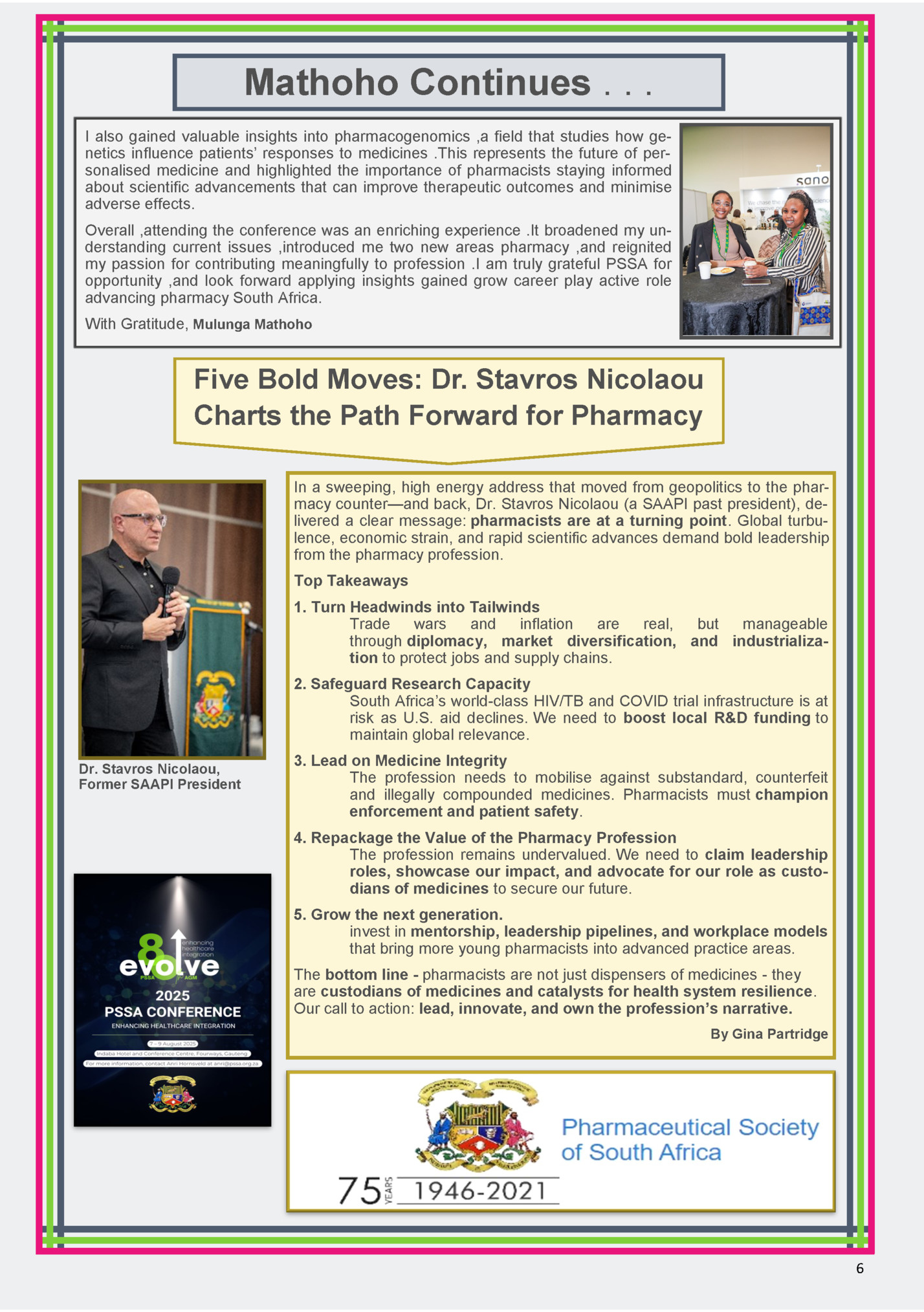
7
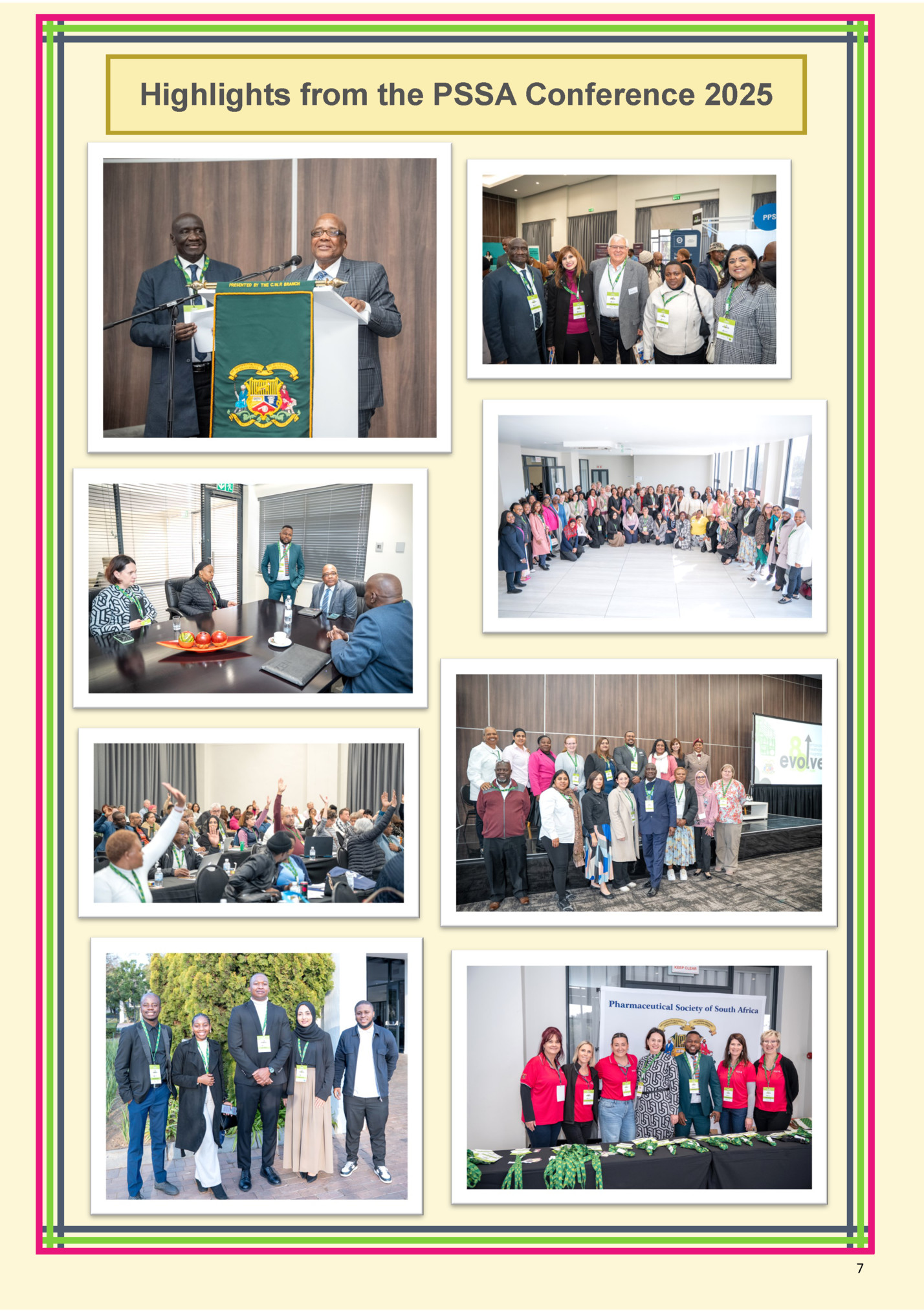
8
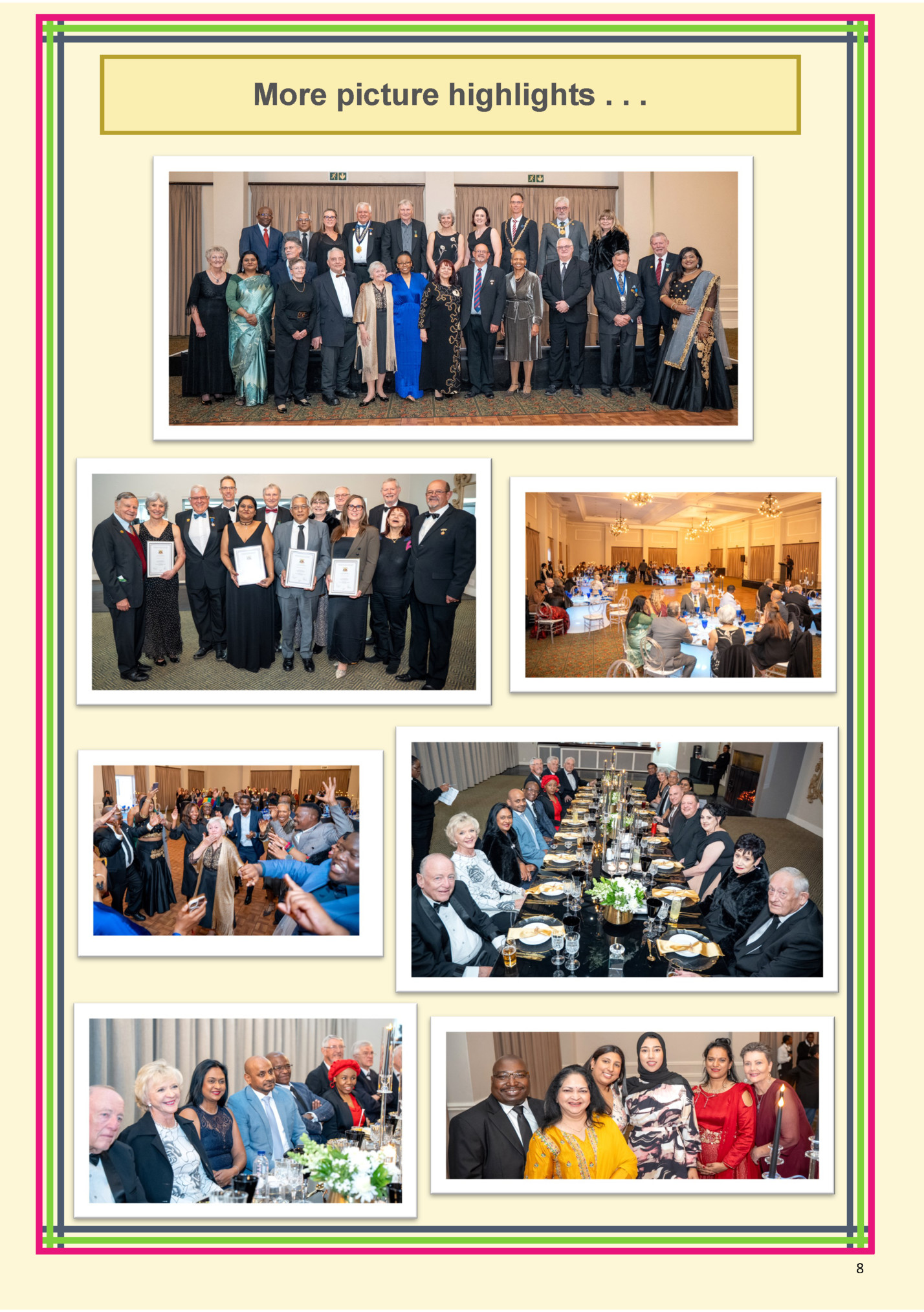
PSSA Conference and 80th AGM 2025 brought together pharmacist from different sectors, and it delivered a truly remarkable event. Day 1 started on a high note with the Minister of Health giving a data driven indication of why UniShoni Mulibana versal Health Coverage (NHI) is critical in strengthening our health system. We also got to see how pharmacists are using AI to advance integration across practice. The key takeaway from this session was that AI will not replace us but pharmacists using AI will. Day 2 started with an informative CPD on pain management and how pharmacists can better understand principles of pain management and the tools that can be used to determine appropriate treatment. Presentations from SAPC, NdoH and SAHPRA gave us insight of challenges faced in the pharmacy profession and the plans in place to mitigate those challenges. The SAPC registrar, Mr Vincent Tlala spoke about changes with requirements for tutors, areas of pharmacy specialities, etc while Dr Luvuyo Bayeni discussed Human Resources for Health and how the NdoH is planning to reach the HRH strategy. Ms Daphney Fafudi highlighted some of the challenges experienced with compounding, general regulatory compliance and the issues relating to substandard and falsified medical products. Day 3 was celebrating women in pharmacy! From hearing Dr Catherine Duggan, the first woman CO of FIP, boldly affirming that women in pharmacy can occupy any space they desire, to Dr Nsovo Mayimele shining in Academia and Ms Razeeya Khan sharing her perspective as a practising oncology pharmacist – the message was clear: there is nothing women cannot achieve when we set our minds to it. This was my first time attending a PSSA conference, and I was truly excited to be part of such a dynamic gathering of pharmacists from all sectors. The programme was rich and informative, featuring topics ranging from the National Health Insurance (NHI) presented by Health Minister Aaron Motsoaledi, to forward-looking discussions on artificial intelligence and its potential to work hand-in-hand with pharmacists to elevate the profession. I also enjoyed engaging talks from sectors I have not been exposed to before, such as community, industry, and academia. On Saturday, National Women’s Day, the conference hosted an inspirational Walk in My Heels session, paying tribute to bold and trailblazing women in pharmacy. A heartfelt thank you to PSSA for organising such a well-structured, exciting, and informative conference. Shaista Nabee We celebrated pharmacists who are trailblazing in journeys less travelled – from Radiopharmacy (Nuclear pharmacy) to disaster management, medico-legal work and entrepreneurship – proving that pharmacy profession has no limits. 9
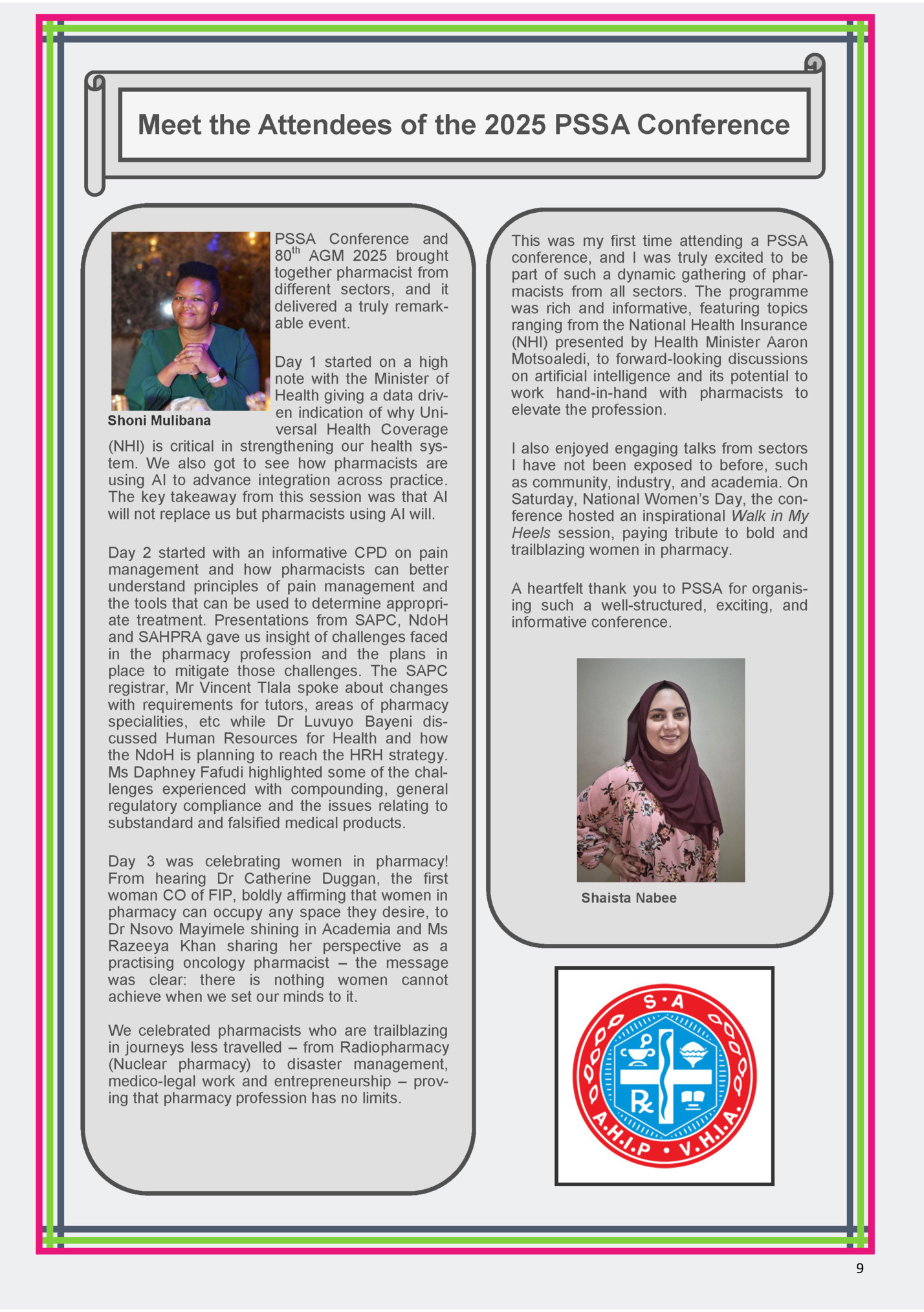
Fleepit Digital © 2021